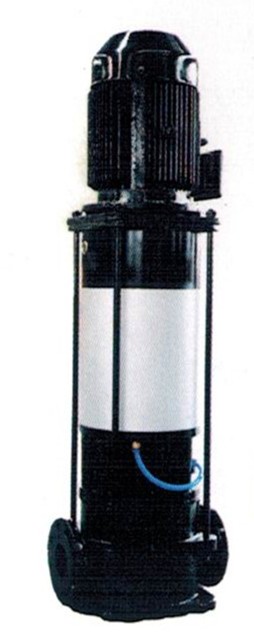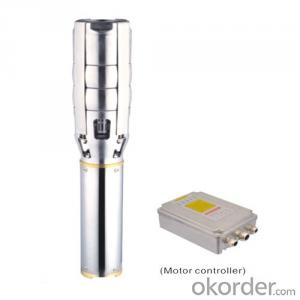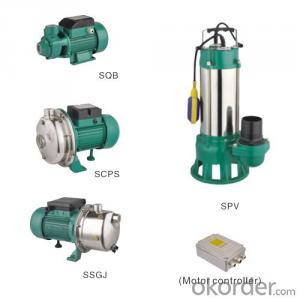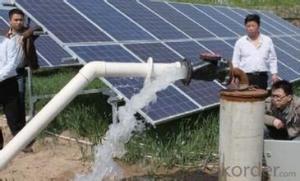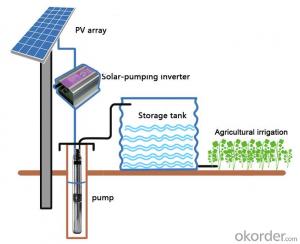Taco Solar Pump L3D-07-250
- Loading Port:
- China Main Port
- Payment Terms:
- TT OR LC
- Min Order Qty:
- -
- Supply Capability:
- 300 sets /month
OKorder Service Pledge
OKorder Financial Service
You Might Also Like
Product description:
Product: Solar water pump
Model:L3D-07-250
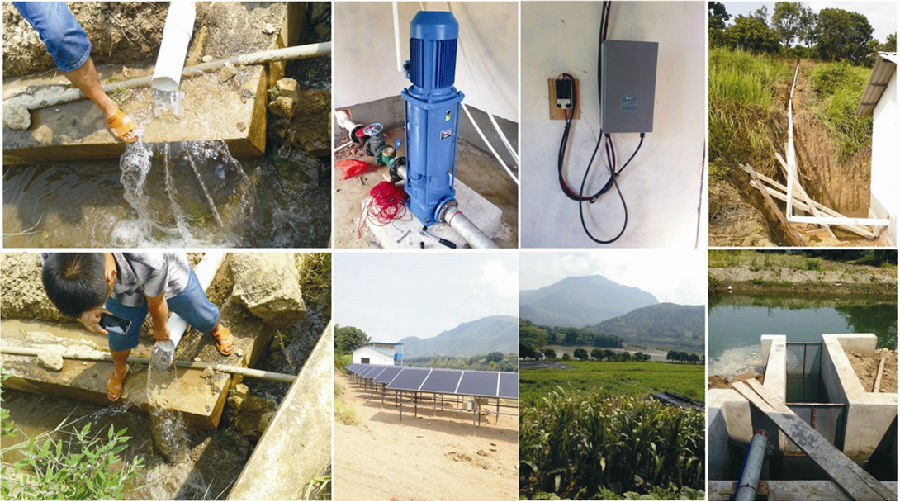
Appilication:
surface pump
for surface water of pond, river, lake
for irrigation of a big farm with 4000 m2 on the top of a high mountain
Product specification:
flow rate:7m3/ hour, 56m3/day.
lift: 10m-250m
pump diameter: 296mm
Pump installed on the ground, outlet to the water surface:4m
with AC motor, motor power:5.5kW
but only need solar power:5.2kW(while Grundfos pump needs at least 18.5kW solar power, our pump can save more than 70% solar panel power,save USD8000 cost for solar panel per set.
Material:
Pump inside: stainless steel and wearable nylon,it enables our solar pump to have 10 years sevice life.
Motor : AC motor, 380V , three phase , 50Hz. The pump also can connect with grid power directly.
Certification:
3 International patent
ISO9001
CE
Warranty:2 years
- Q: Can a solar pump be used for dewatering purposes?
- Yes, a solar pump can certainly be used for dewatering purposes. Solar pumps are designed to harness energy from the sun and convert it into power to operate the pump. They can effectively move water from one location to another, making them suitable for dewatering applications such as draining flooded areas, removing excess water from construction sites, or managing water levels in agricultural fields. The use of solar pumps for dewatering not only helps save on energy costs but also promotes sustainability by relying on renewable energy sources.
- Q: Can a solar pump be used for water supply in industrial applications?
- Yes, a solar pump can be used for water supply in industrial applications. Solar pumps are reliable and efficient systems that can provide a sustainable solution for water supply in industrial settings. They can be used for various purposes such as irrigation, water circulation, and even water treatment processes. With advancements in technology, solar pumps have become increasingly popular in industrial applications due to their cost-effectiveness, low maintenance requirements, and environmentally friendly operation.
- Q: Are there any limitations to the flow rate of water a solar pump can handle?
- Yes, there are limitations to the flow rate of water that a solar pump can handle. The flow rate of a solar pump is usually determined by the size and capacity of the pump, as well as the amount of sunlight available to power the pump. The size and capacity of the pump will determine its maximum flow rate. If the pump is too small or has a limited capacity, it may not be able to handle high flow rates of water. In such cases, the pump may struggle to deliver water efficiently or may even fail to pump water at all. Additionally, the amount of sunlight available to power the solar pump can also impact its flow rate. Solar pumps rely on solar panels to convert sunlight into electricity, which is then used to power the pump. If there is insufficient sunlight or if the solar panels are not properly positioned or maintained, the pump may not receive enough power to operate at its maximum flow rate. It is also worth noting that the flow rate of a solar pump may vary depending on the time of day and weather conditions. For example, during cloudy days or in the early morning or late afternoon when the sun is less intense, the flow rate may be reduced. Therefore, while solar pumps are a sustainable and eco-friendly solution for water pumping, they do have limitations in terms of flow rate. It is important to carefully consider the size and capacity of the pump and ensure proper maintenance of the solar panels to optimize the flow rate of water.
- Q: How does the size of the water storage tank affect the performance of a solar pump?
- The size of the water storage tank can affect the performance of a solar pump in several ways. Firstly, a larger tank allows for more water to be stored, thus increasing the available water supply for the pump. This can result in a steady and consistent water flow, especially during periods of low sunlight or variable weather conditions. Additionally, a larger tank can help compensate for any fluctuations in solar energy availability. When there is excess sunlight, the solar pump can fill up the tank, creating a reserve that can be used during periods of reduced sunlight. This ensures a more reliable water supply and prevents interruptions in pumping operations. Moreover, a larger tank can also reduce the frequency of starting and stopping the pump. This is because the pump can run for a longer duration, drawing water from the tank, before needing to turn off. Reducing the number of start-stop cycles can improve the overall efficiency and longevity of the pump. In summary, a larger water storage tank for a solar pump enhances water availability, compensates for variations in solar energy, and optimizes pump performance by reducing the frequency of start-stop cycles.
- Q: What is the maximum suction lift a solar pump can achieve?
- The maximum suction lift a solar pump can achieve depends on various factors such as the pump's design, efficiency, and the altitude at which it operates. Generally, a well-designed solar pump can achieve a suction lift of up to 6-8 meters, but it is important to consult the manufacturer's specifications for the specific model being considered.
- Q: Can a solar pump be used for water supply in schools and hospitals?
- Yes, a solar pump can be used for water supply in schools and hospitals. Solar pumps are an efficient and sustainable solution that can provide a reliable water source for these institutions. They can operate in remote areas without access to electricity, reducing reliance on fossil fuels and minimizing operating costs. Solar pumps are also environmentally friendly, making them an ideal choice for schools and hospitals aiming to reduce their carbon footprint.
- Q: Can solar pumps be used for dewatering or flood control?
- Yes, solar pumps can be used for dewatering or flood control. Solar pumps are capable of pumping water from flooded areas or removing excess water from low-lying areas, making them an effective and sustainable solution for dewatering and flood control. They operate using solar energy, eliminating the need for electricity or fuel and reducing carbon emissions. Moreover, solar pumps are often portable, easy to install, and require minimal maintenance, making them a practical choice for such applications.
- Q: Can a solar pump system be integrated with a smart home or automation system?
- Yes, a solar pump system can indeed be integrated with a smart home or automation system. The integration of these technologies allows for increased efficiency, convenience, and control over the solar pump system. By connecting the solar pump system to a smart home or automation system, users can remotely monitor and control the operation of the pump. This can be done through a smartphone application or a central control panel within the smart home system. Users can easily adjust the pump's settings, such as flow rate and timing, from anywhere with an internet connection. Moreover, the integration with a smart home or automation system enables the solar pump system to be synchronized with other devices and systems within the house. For example, the pump can be programmed to automatically turn on and off based on temperature or humidity levels, or it can be linked to a rainwater harvesting system to ensure efficient water usage. Additionally, integrating a solar pump system with a smart home or automation system allows for data monitoring and analysis. Real-time data, such as solar irradiance levels, water flow rate, and energy consumption, can be collected and analyzed to optimize the performance of the pump system. This information can be used to identify potential issues, track energy savings, and make informed decisions regarding maintenance or upgrades. In summary, integrating a solar pump system with a smart home or automation system offers numerous benefits, including remote control, synchronization with other devices, and data monitoring. This integration allows for a more efficient and convenient operation of the solar pump system, enhancing overall energy efficiency and sustainability in the smart home or automation setup.
- Q: Can a solar pump be used for mine dewatering?
- Indeed, mine dewatering can be accomplished with the utilization of a solar pump. These pumps are not only friendly to the environment but also provide a cost-efficient alternative for expelling water from mines. By harnessing the power of solar energy, they eliminate the necessity for electricity or fuel. Furthermore, solar pumps possess the capacity to manage substantial amounts of water and can be tailored to fulfill the precise demands of mine dewatering. Moreover, their reliability is remarkable, requiring only minimal maintenance. Additionally, the employment of solar pumps in mine dewatering diminishes the carbon footprint and lessens dependence on fossil fuels, thereby establishing a sustainable solution for mining operations.
- Q: What types of solar pumps are available in the market?
- There are several types of solar pumps available in the market, including submersible solar pumps, surface solar pumps, and floating solar pumps.
Send your message to us
Taco Solar Pump L3D-07-250
- Loading Port:
- China Main Port
- Payment Terms:
- TT OR LC
- Min Order Qty:
- -
- Supply Capability:
- 300 sets /month
OKorder Service Pledge
OKorder Financial Service
Similar products
Hot products
Hot Searches
Related keywords

